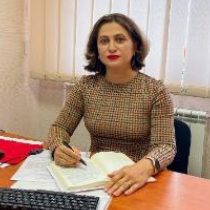
Lesia O. Shevchuk
Work place: National Transport University, Kyiv, Ukraine
E-mail: le.shevchuk@ntu.edu.ua
Website: https://orcid.org/0000-0001-8113-0509
Research Interests:
Biography
Lesia O. Shevchuk She was born in Uman, Ukraine, on May 06, 1985. She graduated from Pavlo Tychyna Uman State Pedagogical University in 2006 with a qualification in Ukrainian Language and Literature, English Language and Literature, and Foreign Literature. Candidate of Pedagogical Sciences (2011), Associate Professor (2014). She has 16 years of practical experience in higher education. Lesia Shevchuk, Candidate of Pedagogical Sciences, Associate Professor, holds the position of the Department Head of Foreign Philology and Translation at National Transport University. The author has more than 90 scientific publications on interdisciplinary research in the fields of theory and methodology of vocational education, foreign language training, information competence of future specialists of higher technical education institutions; foreign philology and translation; theory of language communication; comparative typology of English and Ukrainian languages.
Author Articles
Professional Business Game as an Active Practice-Oriented Method of Teaching Modern Students in Technical Higher Education Institutions
By Lesia M. Kozubtsova Valerii O. Lishchyna Igor M. Kozubtsov Halyna L. Isaienko Lesia O. Shevchuk
DOI: https://doi.org/10.5815/ijeme.2025.04.05, Pub. Date: 8 Aug. 2025
The purpose of the scientific article is to identify a possible solution to the problem of improving students’ training effectiveness through the combined usage of active forms and methods of teaching students among the dependent learning parameters set. The authors came to this hypothetical opinion based on the comparative analysis results of previous studies, which confirm that the usage of active forms and methods of teaching students is the right vector for solving the lifelong problem of learning improving the effectiveness.
It has been established that the available psychological and pedagogical literature does not provide specific solutions for modern students - cyber-socialised youth, which would help to substantiate the best ways to intensify students' learning and cognitive activity.
Previous scientific studies have confirmed that the group of people who are most addicted to computer games, as practice shows, is difficult to motivate to study using traditional approaches when there is a distracting and, to some extent, gambling factor.
Based on these circumstances, the proposed research is obviously logical from the need to improve the theory and methodology of vocational education through the usage of active forms and methods of teaching students. New circumstances have determined the subject of the study, which is a professional business game. It has been experimentally determined that during a professional business game students will use simulation models to solve professional problems. To organise and conduct a professional business game, teachers define game and functional goals. In the above variant of the professional business game structural scheme, the goal of accelerating the discipline development through students' learning activation is achieved. Organising and conducting a professional business game as an active teaching method involves preparation of both students and teachers for it, and also requires the methodological materials and technical means availability, which helps to increase the classes effectiveness conducted in a game form and to form professional competencies in students. The article provides practical steps for preparing participants of a professional business game.
Other Articles
Subscribe to receive issue release notifications and newsletters from MECS Press journals